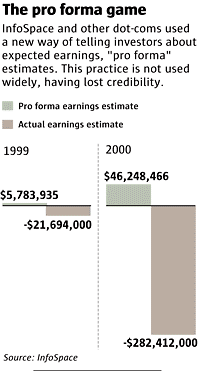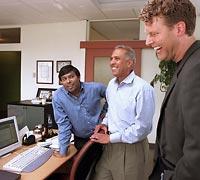Part 2: Cashing Out
When times got tough, execs hid troubles, dumped stock
/ Seattle Times staff reporters
![]() PEDRO PEREZ / THE SEATTLE TIMES, 2000
PEDRO PEREZ / THE SEATTLE TIMES, 2000
Though their relationship would sour, InfoSpace Chairman Naveen Jain, left, and Go2Net CEO Russell Horowitz, right, are all smiles at a July 2000 conference call with analysts about the companies' upcoming merger. Arun Sarin, InfoSpace CEO, is at center. Within six months, all had quit. Only Sarin did not sell his stock.
When InfoSpace Chairman Naveen Jain went on CNN's financial network in late 2000, he proclaimed that his Internet company was doing great. "Our wireless business is on fire!"
But privately, he and key executives knew better.
As the company's finances worsened, key executives angled to get around trading restrictions to sell large blocks of personal stock before its value evaporated. Others just quit and sold their holdings.
Unknown to investors, Jain and his top two executives all resigned in a single week."I had never heard of anything like that before," Rick Thompson, former InfoSpace executive vice president, said in court documents. "It was the [Exxon] Valdez running along with nobody driving the damned thing."
Five years ago this week, at the peak of the dot-com stock mania, InfoSpace was worth $31 billion and was promising to eclipse Microsoft by bringing the Internet to everyone's cellphone.
But InfoSpace's success was an illusion, built on accounting tricks and the hype of charismatic founder Jain, a Seattle Times investigation has found.
InfoSpace had merged that October with another dot-com and, as a result, key executives could sell only a few shares for the next six months. Sales of too many shares by insiders would violate securities law and require InfoSpace to report a $1 billion loss, devastating its stock.
But interviews, court records and internal company documents show:
Key InfoSpace players
![]()
![]()
Ellen Alben: general counsel
Tammy Halstead: chief accounting officer
Larry Hile: outside auditor, Deloitte & Touche
Russell Horowitz: president
Naveen Jain: founder, chairman
Garth MacLeod: finance director
Arun Sarin: chief executive officer
Rick Thompson: executive vice president
• InfoSpace general counsel Ellen Alben demanded a demotion to skirt trading restrictions and made $1.6 million selling her stock. When her successor urged her not to sell, he said Alben brushed him off.
• Chief accounting officer Tammy Halstead took a demotion to staff accountant and sold $627,500 of stock. Jain said she wanted an "Ellen deal."
• InfoSpace concocted a plan to give its chief technology officer, who had financial problems, a fake demotion to allow him to sell shares. But in an anxious voice mail, the company's auditor warned, "If we got caught, we could burn."
• Jain himself accused several fellow executives of illegal insider trading, saying they sold stock knowing InfoSpace revenue projections were vastly inflated.
Through it all, faithful shareholders lost their savings. A dollar invested in InfoSpace at its peak five years ago is worth 3 cents today.
InfoSpace today has new managers and a culture that won't tolerate accounting tricks and exaggerations, CEO James Voelker said. The Bellevue company is profitable.
The story of InfoSpace's turmoil emerges now because The Seattle Times won a two-year legal battle to obtain thousands of pages of company records that had been sealed in a local shareholder lawsuit.
The documents, along with scores of interviews, offer a rare look at the insider dealings at what was once the region's biggest dot-com.
Two leaders clash
It was the summer of 2000 and Naveen Jain faced serious problems.
 |
InfoSpace had made a name for itself as one of the few profitable dot-coms. But it relied on a controversial accounting method, used by many dot-coms, to calculate those profits. Known as "pro forma," this method didn't include such one-time expenses as the costs involved in buying a company.
When InfoSpace reported $46 million in pro-forma profits for 2000, for example, the company, by Securities and Exchange Commission accounting standards, had actually lost $282 million.
That summer, InfoSpace was losing money even using pro forma calculations. Jain needed to find revenues to buoy the stock price, then around $50 a share.
An accomplished deal maker, Jain believed he had found a fix: a $1.5 billion merger with Go2Net, a Seattle dot-com that ran Web sites and search engines.
On paper, Go2Net was profitable, plumped up with $426 million in financial backing from Microsoft co-founder Paul Allen's Vulcan Ventures. With Go2Net, Allen and other investors had placed a huge wager on the concept of connecting the masses to the Internet through their cable-ready TVs, using them as a big, interactive computer screen, downloading movies and music, and searching and shopping the Web.
But the merger sparked more problems than it solved.
Jain and Go2Net chief executive Russell Horowitz, then 33, soon developed a personality clash. Jain was boisterous and freewheeling, while Horowitz was pensive and private.

Go2Net's stock was climbing in March 1998, with young CEO Russell Horowitz at the helm. Horowitz now heads the online marketing firm Marchex. |
Horowitz thought Jain's claim that InfoSpace would make billions by charging the world's cellphone users monthly fees was misleading. Most cellphones couldn't access the Internet at all; those that could had painfully slow connections. What's more, cellphone users were reluctant to pay for stock quotes and weather reports they could get elsewhere for free.
By the time the companies formally merged on Oct. 12, 2000, Rick Thompson, an executive vice president, expressed contempt for Jain, records show. Thompson had been traveling with Jain to meet with fund managers and analysts, and he was shocked by Jain's extravagant claims about the company's finances and upcoming products, he later said in court documents.
The day after the merger, in a meeting with new president Horowitz, Thompson brought a list of obstacles facing the new InfoSpace. At the top: "Naveen." Others included: "reality versus the smoke," "assume nothing" and "verify everything."
Horowitz quietly put plans in place to keep Jain out of the media.
Skirting the rules
Despite the merger, InfoSpace's share price continued to fall. This alarmed insiders who watched their personal fortunes in InfoSpace stock slipping away.But since the announcement of the merger, Horowitz, Jain, Alben, Halstead and other top executives were prohibited by federal securities laws from selling more than a minimal amount of their holdings until late January 2001.
By early October, Russ Arun, InfoSpace's chief technology officer, faced a personal financial crisis. In an e-mail to Jain, Arun said his stock-option riches from Microsoft, where he once worked, had been wiped out and he needed $5 million to pay income taxes.
Arun thought that if he quit, he could then sell his stock. But InfoSpace wanted Arun to stay and tried to find a way to enable him to raise the cash.
One idea was to demote Arun so that he was no longer an executive, allow him to sell stock, and later promote him back to his current job. Halstead, chief accounting officer, presented this plan to Larry Hile, a partner at the auditing firm Deloitte & Touche in Seattle.
As InfoSpace's auditor, Hile's job was to serve as a watchdog for the stockholders and to make sure that InfoSpace accurately reported its financial condition.
|
In an Oct. 11 voice mail to Halstead, Hile raised concerns about the plan to demote Arun. Would it be a real demotion? Would Arun get paid less than his new boss? They might need to wait a year before giving Arun his old job back.
Hile said he had consulted with Russ Golden, a Deloitte colleague. "This is one that Russ feels is pretty dangerous to do," Hile said in the voice mail. "If we got caught, we could burn."
Gary Zeune, an accounting-fraud expert in Columbus, Ohio, said recently that it is shocking that the auditor was discussing a phony demotion.
"To me, that's clearly illegal. It's securities fraud," Zeune said. "What [Hile] should have said is, 'If you're going to do that, we're not going to be associated with you.' "
Hile later told the company not to carry out the demotion scheme, court documents show.
Hile declined to be interviewed. Deloitte & Touche said recently: "Any suggestion that Deloitte and Mr. Hile agreed to accept anything short of full and complete compliance with the rules is contrary to the evidence and is false."
Heeding Hile's advice, InfoSpace devised a new plan. Without telling its board of directors or seeking its permission, InfoSpace loaned Arun $4 million, allowing him to use his 200,000 InfoSpace shares as collateral. If he stayed for a year, Arun wouldn't have to repay the loan.
In essence "we agreed to buy those 200,000 shares at the current (market price)," Jain later said in an interview.
On Oct. 25, 2000, the newly combined management team faced its first conference call with stock analysts. The call was being broadcast to the public over the Internet. Jain and his managers hoped the analysts would continue to tell investors to buy InfoSpace.
That would be unlikely if the analysts knew the bad news that finance director Garth MacLeod earlier had given Jain and others. The merger was exacerbating revenue problems, he'd said. Revenue for the fourth quarter, expected to be $72 million, was going to fall $15 million to $20 million short.
Optimism in public
Talking with stock analysts could be a delicate dance. Securities law prohibits executives from misleading investors about company finances.In preparing for the call, InfoSpace executives knew analysts had been asking for more information about its wireless Internet business — the key to the company's future success.
But they couldn't even agree on how much wireless revenue they had. MacLeod told Jain and chief accountant Halstead that wireless revenue made up only 8 percent of revenue.
Halstead disagreed, saying wireless accounted for 13 percent of revenue.
Your number is misleading, MacLeod replied to her by e-mail, because "as we know [it] is inflated by warrant revenue" and one-time startup fees.
Jain picked the higher figure. "I am at ease with our decision and let's roll with it," he said.
During the conference call with analysts, Jain, Horowitz and other InfoSpace executives gave no hint of the fourth-quarter troubles facing the company. The mood was upbeat, transcripts show. In fact, things were going so well, executives said, that the company was increasing its fourth-quarter revenue forecast.
What's more, the company said it was "extremely confident" that annual revenue would soar to $360 million in 2001, up from about $215 million.
Jain appeared on CNN's financial network the next day and bragged: "Our wireless business is on fire!"
"Over a barrel?"
Another insider who wanted to sell stock was chief counsel Ellen Alben. She demanded that Jain demote her to a part-time staff attorney, working 15 hours a week but at full pay, court records show. Once she was no longer an executive, she planned on cashing out her stock.Jain was furious with Alben, worried that any future sales would cause trouble at a tricky time for the company.
Joanne Harrell, head of human resources, asked Jain in an Oct. 25 e-mail, "If she knows where all the 'dead bodies are' does she have us over a barrel? Or is it worth a court case with her?"
"Are you saying that we should give in to blackmail?" Jain replied. "Nobody has a sweet deal like her. I will like to sign up a deal like that too, where I work for 15 hours and get full pay. Where do I sign up?"
When Alben announced plans to sell all of her stock later that year, her replacement raised the prospect of suing her. "This would be ugly, however," wrote Ed Belsheim, the new general counsel.
He tried to change Alben's mind but she replied that "she was not going to see her investment reduced to a small amount and she was going to sell," according to Belsheim's account.
Alben made a "veiled threat," saying she was selling because "you don't know what I know," Belsheim noted.
In an interview several months ago, Alben said she stepped down as general counsel because she wasn't interested in working at what was now a big company. She said she sold stock late in the year to reduce her tax bill, not because she saw trouble coming for the company.
"Wanting to sell a whole bunch of shares was not my motivation. If I had wanted to do that, I would have done it well before the closing from the Go2Net merger" when stock prices were higher, she said. Records show she sold $12.5 million in shares before the merger and $1.6 million after.
Alben also said in court records that she believed the trading restrictions no longer applied to her. She had consulted with Larry Hile — the auditor from Deloitte & Touche — and with an outside lawyer about whether an executive at her level could sell InfoSpace stock 30 days after quitting or being demoted. She said they gave her their blessing.
An expert later hired by InfoSpace representatives in a shareholder lawsuit said there was no 30-day rule and concluded that Alben's sale of stock violated securities laws.
Another executive wanted to cash in her stock during the waiting period. In November, according to Jain, Tammy Halstead wanted an "Ellen deal."
Halstead had clashed with Horowitz, company president, who didn't like her accounting methods, according to court records. For example, Halstead credited InfoSpace with $1 million in revenue for services it sold to American Express, but the $1 million actually was a value she assigned to the "exclusivity" of the deal.
Under accounting rules, payments for a service can't be counted as revenue until the service is performed.
Horowitz wanted her fired, records show. But during a heated meeting, Jain and others strongly backed her.
Halstead accepted a demotion to staff accountant in November and soon sold most of her InfoSpace stock, making $627,500, records show. Halstead's lawyer recently said she couldn't comment because she had agreed to confidentiality when settling a shareholder lawsuit. In court records, she said she sold because she needed money for taxes, and left InfoSpace because her future there after the merger was limited.
Pessimism in private
|
Behind closed doors, Horowitz was sounding alarms about lagging revenue. In an e-mail to Jain and others, he noted that $16 million in revenue was coming from one-time deals that "fall off" at the end of the year.
"In looking at Q1, we have some SERIOUS work to do," Horowitz wrote on Nov. 15, 2000. He warned that InfoSpace needed to come up with another $40 million just to meet the first quarter target of $78 million.
Two weeks later, Horowitz received more bad news from the finance director. For the second and third quarters of 2001, InfoSpace had signed contracts for only one third of the revenue the company had told Wall Street to expect.
As for deals in the works, the "pipeline is anemic," the finance director wrote.
|
Its stock, trading around $11, down from $50 in midsummer, would take a beating if InfoSpace failed to meet its financial promises.
On Dec. 11, 2000, InfoSpace was dealt a blow by the man who once had boosted the company's stock by being its most influential cheerleader.
Famed Internet stock analyst Henry Blodget at the brokerage house Merrill Lynch had been receiving hate e-mail for months from stockbrokers who had followed his strong recommendation to buy InfoSpace stock. The brokers had been getting hit with complaints from angry clients who had lost money on InfoSpace.
Why was he backing InfoSpace so strongly when company insiders were selling so heavily? they asked by e-mail.
Merrill Lynch had made millions as a consultant in the Go2Net merger. But Blodget had lost confidence in InfoSpace, records show. He asked a colleague to remove the stock from the brokerage house's most-favored-stocks list.
|
"Can we please reset this stupid price target and rip this piece of junk off whatever list it's on?" he wrote Oct. 20. "If you have to downgrade it, downgrade it."
It took seven weeks, but on Dec. 11, Merrill Lynch downgraded InfoSpace to "accumulate." The decision pummeled the stock, which fell 16 percent that day.
InfoSpace employees, who'd been watching their wealth evaporate for months, were shell-shocked and urged their executives to respond.
"It is difficult to see the NASDAQ ready to take off when we keep tanking and no reaction comes to calm down a growing frustration," one employee wrote Jain.
After internal debate, InfoSpace issued a news release on Dec. 13, saying it expected to meet its fourth-quarter revenue target. It added: "InfoSpace continues to experience momentum across all of our areas of focus, and we remain very confident with the financial guidance we have previously provided."
|
It was obvious by then that InfoSpace could not meet its target of $360 million for 2001, Jain would later insist. He was in India at the time and said he wasn't involved in the release. Before Dec. 13, however, he and other insiders had seen internal forecasts that indicated the $360 million figure was two to three times greater than it should have been, Jain told lawyers doing a confidential investigation for InfoSpace's directors.
After Horowitz sold $1.4 million of InfoSpace shares on Dec. 15, Jain lashed out. Jain was furious at Horowitz because the sales signaled that insiders didn't believe in their own company and would drive investors to unload their InfoSpace stock.
In court documents, Horowitz said that he didn't know the $360 million forecast needed to be revised until a month after he sold his shares. He contended that the Dec. 13 press release was not about the $360 million figure.
No one in charge
Just after the New Year, executive vice president Thompson pushed his friend Horowitz to take control of InfoSpace, calling in an e-mail for an "insurrection.""We have to make something happen," Thompson wrote Jan. 4, 2001. "This company has a great opportunity and it is dying of cancer at the same time."
The next day, Thompson lectured Horowitz for his inaction: "When you get pissed off or disillusioned, you sort of disappear. We all [are] starting asking each other, 'You seen Russ? What's he up to?' What we want is for you to rally us and to be our QB and to tell us how to get into the fight and what hill to take."
Instead of taking control, Horowitz quit on Jan. 8, 2001. InfoSpace's board assumed that most of the former Go2Net executives running InfoSpace would bolt as well, and sprang into action.
"He is fed up with InfoSpace's board and with Naveen," Thompson explained in a phone call to InfoSpace Chief Executive Officer Arun Sarin, court records show.
What would it take to keep Horowitz? Sarin asked.
You and Jain would both have to quit, for starters, Thompson replied.
On Jan. 10, Jain and Sarin both quit — leaving no one in charge.
The board tried to get Horowitz to return. He listed several demands, including making Jain personally pay $16 million to an employee investment fund that had tanked.
During negotiations, word spread that Jain was looking at office space in the same Bellevue building to start his own wireless company. His business concept involved micropayment technology — using a cellphone, for instance, to order and pay for a latte at Starbucks and having it ready when the customer walked in the door.
Some within the company were aghast. "There is NO way we can allow this," one manager said in an e-mail. "I think he's trying to do a land grab for one of the most prized [technologies] that we could offer."
Horowitz negotiated with Jain on terms of taking over the company. When they reached an oral agreement, the two men hugged. The board was relieved.
But on Jan. 20, 2001, Horowitz told the board he was quitting for good. He told friends he didn't think InfoSpace could deliver a "clean company" to him, and that Jain, its largest shareholder, would never truly cede power.
The board decided it had no choice but to ask Jain to return and run InfoSpace as chairman and CEO. Thompson could not believe it and lashed out at Jain, telling him "the Board had failed to do its job and had embraced a crook," court records show. Thompson was forced to resign.
On Jan. 22, the InfoSpace directors finally let investors and the public know about Horowitz's resignation and Jain's expanded duties.
In a press release, Horowitz was full of praise: "InfoSpace is exceptionally well positioned for success and I have very much enjoyed working with the strong management team in place."
Jain, his new chief financial officer, Halstead, and others quickly threw aside the $360 million revenue forecast, cutting it to $215 million for 2001.
Horowitz sold all of his InfoSpace stock on Jan. 31, making $33 million. A company investigation later concluded that Horowitz may have illegally sold his stock based on insider information about an impending layoff. Two other executives were also named as possible illegal insider traders.
InfoSpace lawyers could have pursued the matter, which might have resulted in millions of dollars being returned to the company and its shareholders. But they did not, giving as reasons "dirty laundry is aired" and "all the issues become very public," court records show.
Horowitz denies he knew about the layoff.
Founders again
Jain stayed at InfoSpace for two more years. He dumped shares of InfoSpace at rock-bottom prices, once even selling 81,900 shares for $1 each. To the investing public, it sent a message: Jain, worth several hundred million dollars, saw little future in the company.The board ousted him around Christmas 2002.
Far from Seattle, the office of New York Attorney General Eliot Spitzer already was investigating a complaint from a Queens, N.Y., pediatrician, who had poured $500,000 into InfoSpace and kept it there at Merrill Lynch's urging.
Before long, investigators found that at the same time Blodget was denigrating InfoSpace as a "powder keg" in e-mail, he publicly promoted the stock to help Merrill Lynch's investment bank division, which was getting $10 million to advise on Go2Net's merger with InfoSpace.
The Spitzer inquiry ended in 2003 with 10 of the nation's largest brokerages agreeing to a landmark $1.4 billion settlement. Blodget was fined $4 million and banned for life from Wall Street.
By then Jain had started a new company, Intelius, which provides public-records information on people.
Horowitz also founded a new company, Marchex. It provides online marketing and search services for merchants.
Last April, Horowitz and his directors took Marchex public, making it the first new public Internet company here since the crash five years ago. With the wildly successful public launch of search engine Google, Wall Street watchers suggest that the dot-coms are coming back.
Last month, Marchex raised $222 million in another stock offering. Horowitz's holdings in his new company are now worth about $190 million.
Naveen Jain says when the time is right, he will consider taking Intelius public, too.
David Heath: 206-464-2136 or dheath@seattletimes.com
Sharon Pian Chan: 206-464-2958 or schan@seattletimes.com
Copyright © 2005 The Seattle Times Company


